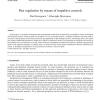Free Online Productivity Tools
i2Speak
i2Symbol
i2OCR
iTex2Img
iWeb2Print
iWeb2Shot
i2Type
iPdf2Split
iPdf2Merge
i2Bopomofo
i2Arabic
i2Style
i2Image
i2PDF
iLatex2Rtf
Sci2ools
AMC
2007
2007
Pest regulation by means of impulsive controls
In this paper, we consider an integrated pest management model which is impulsively controlled by means of biological and chemical controls. These controls are assumed to act in a periodic fashion, a nonlinear incidence rate being used to account for the dynamics of the disease caused by the application of the biological control. The Floquet theory for impulsive ordinary differential equations is employed to obtain a condition in terms of an inequality involving the total action of the nonlinear force of infection in a period, under which the susceptible pest-eradication solution is globally asymptotically stable. If the opposite inequality is satisfied, then it is shown that the system under consideration becomes uniformly persistent. A biological interpretation of the persistence condition is also provided. Ó 2007 Elsevier Inc. All rights reserved.
| Added | 08 Dec 2010 |
| Updated | 08 Dec 2010 |
| Type | Journal |
| Year | 2007 |
| Where | AMC |
| Authors | Paul Georgescu, Gheorghe Morosanu |
Comments (0)

